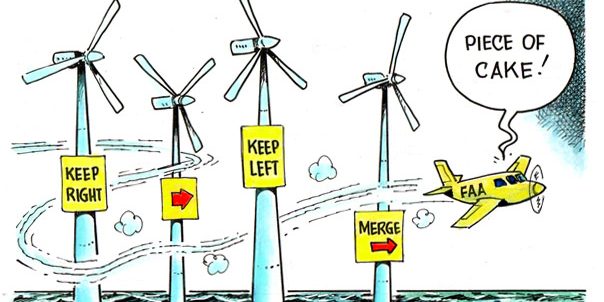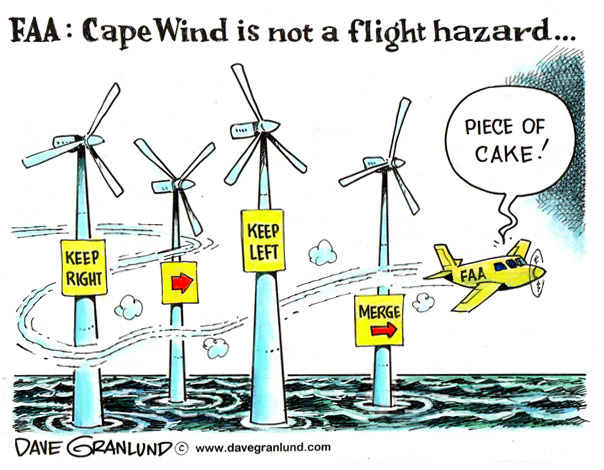After 10 years of planning and $70 million, hot air seems to be the only renewable energy generated by the Cape Wind project. The construction of a vast wind farm off the coast of Cape Code seems like a great way to generate a major source of renewable energy for the State of Massachusetts. What could possibly go wrong?
The New York Times chronicles this well intended debacle in painful detail, including regulatory hurdles, local and environmental opposition, along with competing special interests and political dissent. The U.S. Green Chamber of Commerce will keep our fingers crossed for a positive outcome. However, the Cape Wind project continues to serve as an expensive example of how competing political interests can turn good intentions and taxpayer dollars into a major snafu.
A Tragicomic Take on Cape Wind – NYTimes.com
WASHINGTON — When the energy entrepreneur Jim Gordon first proposed building the Cape Wind project in Nantucket Sound, he assumed the project would be a slam dunk. Liberal Massachusetts communities would surely embrace a clean energy initiative, he figured.
More than 10 years later, the offshore project is still not up and running, although it has passed some regulatory hurdles and survived a few legal challenges from locals who oppose the project. The long controversy is now the focus of a documentary, “Cape Spin: An American Power Struggle,” which opened on Friday in Washington after showings in Boston and a sprinkling of film festivals.
“The film isn’t for or against the project,” said Josh Levin, one of the film’s producers. “Our focus is on the insane waste of energy” — if you’ll excuse the choice of words, he said — “that went into this 10-year, $70 million battle that still is not resolved while Cape Cod still continues to enjoy the worst air quality and the highest asthma rates in Massachusetts.”The documentary turns a tragicomedic lens on screaming dissent at public hearings, protests by costumed demonstrators, caustic advertising campaigns against the project and dueling op-ed articles during Mr. Gordon’s pursuit of regulatory approval from various layers of government.
Some were concerned that the wind turbines, rising 440 feet above the water, would be noisy eyesores that would lower property values and hurt tourism and marine ecosystems and impede maritime traffic. Others argued that the project would increase energy bills rather than reduce them.
The clash pitted neighbor against neighbor and environmentalist against environmentalist while also forging strange political alliances. “He ended up with liberal icons like the Kennedys and conservative moguls like the Kochs on the same team against him,” Mr. Levin said of Mr. Gordon. “And when you end up with the Kennedys and the Kochs on the same side of an issue, those are truly strange bedfellows.”
While Mr. Levin considers the wind project a serious issue, he ended up taking a satirical approach because he found so much of the debate ridiculous. But he does not take a cynical view of the problems, he adds.
“It was the first offshore wind farm proposed in the U.S., and the nation lacked a clear regulatory path established for how such a project would get approved,” he said. “Whether you are a green person or not, whether you are a renewable energy person or not, whether you’re a pro-business person or not, there is a cost to the United States having no effective energy policy.”
The project appeared to be edging toward realization when the Federal Aviation Administration cleared the wind farm in April 2010. But last October a federal appeals court told the F.A.A. to review the project again.
Last week Representative Cliff Stearns, a Florida Republican, called for a House investigation “to determine if the F.A.A. acted inappropriately due to political pressure” from the Obama administration.
The White House fired back a retort. “This is the same member of Congress who wasted over $1 million of taxpayer dollars on a politically motivated investigation that has turned up zero evidence of wrongdoing,” it said. The White House was alluding to Mr. Stearns’s role in an investigation of the collapse of Solyndra, a solar panel maker that had received millions of dollars in federal loan guarantees from the government
“If we were still shooting, that would just be another chapter,” Mr. Levin said. “Isn’t it interesting that it’s a congressman from Florida? And before that, it was a senator and then a representative from Alaska who were the biggest obstructionists to Cape Wind. Why are these far-flung Congress people getting involved in this Massachusetts issue?”
Mr. Levin said he wouldn’t be surprised if the conflict spilled into the next decade but that the crew had no plans for a sequel. “I doubt it would still be funny,” he said.









